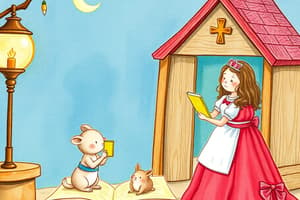Podcast
Questions and Answers
Which of the following is NOT a characteristic that determines a child's social status?
Which of the following is NOT a characteristic that determines a child's social status?
- Being helpful
- Being cooperative
- Being athletic (correct)
- Being friendly
What is the main reason why 'nerds' and 'geeks' are unpopular?
What is the main reason why 'nerds' and 'geeks' are unpopular?
- Lack of physical appearance
- Lack of athletic ability
- Lack of social skills (correct)
- Lack of intelligence
What characteristics enhance popularity in middle childhood?
What characteristics enhance popularity in middle childhood?
- Intelligence (correct)
- Physical appearance
- Athletic ability
- All of the above
Which of the following is NOT a characteristic that influences a child's popularity?
Which of the following is NOT a characteristic that influences a child's popularity?
What is the main factor that determines a child's popularity?
What is the main factor that determines a child's popularity?
What is the main reason why 'nerds' and 'geeks' are unpopular?
What is the main reason why 'nerds' and 'geeks' are unpopular?
What is the main reason why rejected children are disliked by their peers?
What is the main reason why rejected children are disliked by their peers?
Which gender is more likely to be rejected by their peers?
Which gender is more likely to be rejected by their peers?
According to Kenneth Dodge, rejected children often fail in their social information processing (SIP) because they
According to Kenneth Dodge, rejected children often fail in their social information processing (SIP) because they
Kenneth Dodge's research suggests that rejected children tend to
Kenneth Dodge's research suggests that rejected children tend to
Rejected children often blame others when there is conflict because they
Rejected children often blame others when there is conflict because they
Which of the following is a characteristic that distinguishes between rejected-withdrawn and neglected children?
Which of the following is a characteristic that distinguishes between rejected-withdrawn and neglected children?
What is a common characteristic found in both rejected-withdrawn and neglected children?
What is a common characteristic found in both rejected-withdrawn and neglected children?
Which of the following statements is true about neglected children?
Which of the following statements is true about neglected children?
Which of the following statements is true about controversial children?
Which of the following statements is true about controversial children?
What is a characteristic of controversial children?
What is a characteristic of controversial children?
How do controversial children differ from popular children?
How do controversial children differ from popular children?
Flashcards are hidden until you start studying
Study Notes
Social Status in Children
- Social status is influenced by a variety of characteristics, including behavior and social skills.
- Factors such as socioeconomic background, parenting style, and peer relationships contribute to a child's social standing.
Popularity in Middle Childhood
- Characteristics enhancing popularity include strong social skills, physical attractiveness, and the ability to be friendly and cooperative.
- Popular children typically engage in prosocial behaviors and are viewed positively by peers.
Rejection and Unpopularity
- "Nerds" and "geeks" are often unpopular due to perceptions of social ineptitude and differing interests that do not align with peer norms.
- Rejected children are frequently disliked because of aggressive behavior, poor social skills, or withdrawal tendencies.
- Boys are generally more likely to experience peer rejection compared to girls.
Social Information Processing (SIP) and Rejected Children
- Kenneth Dodge's research highlights that rejected children struggle with social information processing, leading to difficulties in interpreting social cues.
- These children often demonstrate a defensive attribution style, blaming others for conflict rather than recognizing their own role.
Characteristics of Rejected and Neglected Children
- Rejected-withdrawn children can be distinguished from neglected children by their level of social withdrawal and tendency to avoid peer interactions.
- A common characteristic among both rejected-withdrawn and neglected children is a higher likelihood of experiencing loneliness and social isolation.
Neglected and Controversial Children
- Neglected children are characterized by their low visibility in social settings, often overlooked by peers rather than actively disliked.
- Controversial children enjoy mixed reactions from peers, having both friends and adversaries, and often possess unique social skills that set them apart from popular children.
Differences in Popular and Controversial Children
- While popular children are generally well-liked and socially skilled, controversial children may engage in behaviors that polarize peer opinions, leading to a more divided social acceptance.
Studying That Suits You
Use AI to generate personalized quizzes and flashcards to suit your learning preferences.




